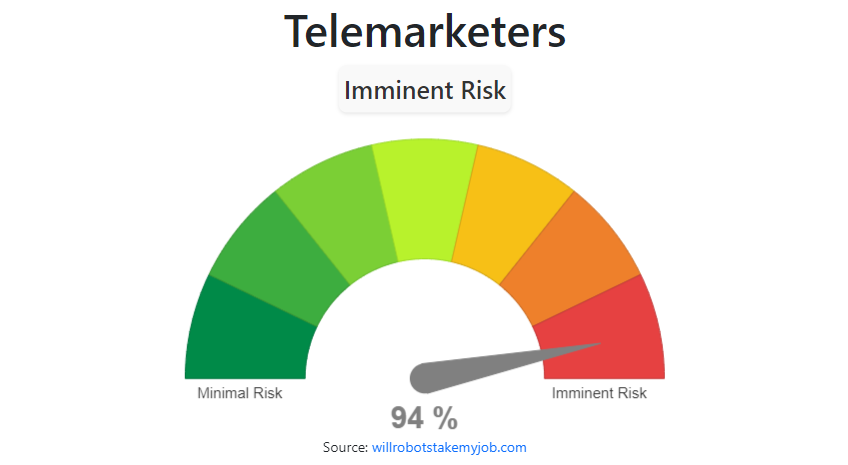
When you make purchases through our links we may earn a small commission.

Photo Credit: Arlington Research
There are 470,766 people employed in the Telemarketing & Call Centers industry in the US as of 2023.
The rapid advancements in artificial intelligence (AI) have raised significant concerns about the displacement of human labor in various industries. Telemarketing and call center jobs, traditionally reliant on human interaction and communication skills, are particularly vulnerable to the disruptive force of AI-driven automation. This article examines the impending transformation of these jobs by 2025 and argues that a minimum cash flow safety net, such as Universal Basic Income (UBI), is an imperative response to mitigate the socio-economic ramifications of AI-induced job displacement. By analyzing historical precedents and evaluating the inadequacies of the ‘welfare and retrain’ model, this article advocates for a proactive approach in addressing the challenges posed by AI and its impact on labor markets.
The convergence of AI and automation technologies has revolutionized industries worldwide, reshaping the dynamics of the labor market. The telemarketing and call center sector, characterized by its reliance on repetitive communication tasks, is poised for substantial disruption as AI-powered systems become increasingly adept at handling customer inquiries, sales calls, and support services. This article critically examines the potential consequences of this impending transformation and advocates for a minimum cash flow safety net as a more effective solution compared to the conventional ‘welfare and retrain’ approach.
The AI Disruption in Telemarketing and Call Centers
The introduction of AI into the telemarketing and call center domain brings forth unprecedented capabilities in natural language processing, sentiment analysis, and cognitive automation. These technologies enable AI systems to not only understand and respond to customer inquiries but also adapt their communication style to varying customer preferences. As AI algorithms continue to learn and improve from vast datasets, they gradually outperform human agents in terms of efficiency, accuracy, and scalability. This shift threatens the livelihood of a substantial workforce engaged in telemarketing and call center operations.
Historical Precedents and the 'Welfare and Retrain' Model
Historical instances of technological disruptions, such as the Industrial Revolution, have led to substantial job displacements. In response, societies attempted to mitigate the adverse effects through retraining programs and welfare initiatives. However, these measures often fell short due to various challenges, including inadequate skill development, lack of suitable job opportunities, and the inertia of existing socioeconomic structures. The ‘welfare and retrain’ model, while well-intentioned, fails to address the systemic challenges posed by the swift and profound transformations introduced by AI-driven automation.
The Imperative of a Minimum Cash Flow Safety Net
As AI continues to displace human labor, a minimum cash flow safety net emerges as a more effective response to the socioeconomic implications. Universal Basic Income (UBI), a policy that guarantees a regular income to all citizens, regardless of employment status, has gained traction as a potential solution. UBI acknowledges the intrinsic value of human dignity and seeks to provide individuals with the means to pursue meaningful endeavors, whether they involve traditional employment, entrepreneurship, education, or creative pursuits. By offering financial stability, UBI addresses the potential pitfalls of the ‘welfare and retrain’ model and enables individuals to adapt to changing economic landscapes without the burden of immediate financial pressures.
Challenges and Considerations
While the implementation of UBI holds promise, it is not without its challenges. Funding mechanisms, economic implications, and the potential for disincentivizing work are concerns that must be carefully addressed. Policymakers must engage in rigorous economic analyses and collaborate with stakeholders to design a UBI system that is both sustainable and conducive to individual and societal well-being.
The rapid advancement of AI technology in telemarketing and call center industries demands a proactive approach to safeguard the livelihoods of affected workers. The historical limitations of the ‘welfare and retrain’ model underscore the need for a minimum cash flow safety net like Universal Basic Income. By embracing UBI, societies can create a buffer against the potentially detrimental effects of AI-induced job displacement, fostering a more equitable and resilient future where individuals are empowered to contribute to society in diverse and meaningful ways. As the AI revolution unfolds, policymakers must seize the opportunity to shape policies that prioritize human welfare in the face of technological progress.
















